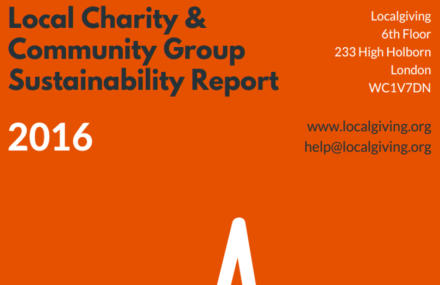A report by digital giving platform Localgiving has found that less than half of local charities surveyed were “confident they would still be operating in five years’ time”.
The report, Local Charity and Community Group Sustainability Report 2016, has been published by Localgiving today in time to coincide with Local Charities Day. Localgiving’s research found that less than half of the 598 local charities and community groups who responded to the survey were confident they would still exist in five years’ time.
This is because, the report said, the local voluntary sectors faces “an ever-increasing demand for services” while, at the same time, “finding it more and more difficult to access funding – particularly to cover core operational costs”.
The net result of this is, without the necessary funding to pay salaries and retain employees, “more than a three quarters of groups are seeing a reduction in paid staff,” which compounds “existing skill gaps and leaving the sector ever more reliant on volunteers”.
The report even found that 21 per cent of local charity respondents are not confident “that their organisation can sustain itself over the coming 12-months”.
It also found that, despite 73 per cent of respondents reporting an increase in demand for their services, just 18 per cent felt “they are sufficiently resourced to meet this demand”.
More than two thirds of respondents also predicted “stagnation or a downturn in their financial position in the coming year”.
Reductions in staff numbers ‘a serious problem’
The report found that 76 per cent of respondents have seen a reduction in staff over the last 12-months, with nearly 90 per cent of local charities and community groups reporting they were operating with “five or fewer” full time employees. 55 per cent of respondents said they had no full time employees at all.
Indeed more than half of respondents said that their organisation’s chief executives and finance staff are volunteers, while 59 per cent said their fundraising activity was “primarily” carried out by volunteers.
The report said that “while it is important for the character of the sector to retain a high proportion of volunteers, such a rapid loss of paid staff is likely to impact negatively on service continuity and capacity, and lead to a reduction overall skills”.
Over three quarters of respondent ‘do not have the skills to run a successful fundraising campaing’
The report also found that 77 per cent of respondents felt they “have the skills to run a successful fundraising campaign”. A further 22 per cent said that, in order to do so, they would need “significant upskilling”.
Some 79 per cent of fundraising and 84 per cent of respondent’s marketing activities were found to be being led by “non-specialist staff”, while 40 per cent said that both activities were entirely led by volunteers or trustees.
The report concluded that the small charity sector has "major fundraising and marketing skills shortages".
‘Covering core costs a major issue in the sector’
As part of its recommendations, the report called for a “more open conversation about the need for funding for core costs”, and said that “if funders want to have a real, sustained impact, they must provide charities with the resources needed to plan for and invest in their futures”.
It also said that “charities must be more vocal about their core funding needs” and the impact fulfilling those needs “would have on their services and beneficiaries”.
Stephen Mallinson, chief executive of Localgiving, said: “Our second annual Local Charity and Community Group Sustainability Report illuminates key issues facing the local voluntary sector. While most groups are confident about their short term survival, fewer than half retain this confidence over five years.
“At present the sector lacks both the time and resources required to invest in their future. Rapid staff turnover, reductions in workforce size and an over-reliance on volunteers are major concerns - inevitably affecting the quality, continuity and durability of services.”
Related Articles













